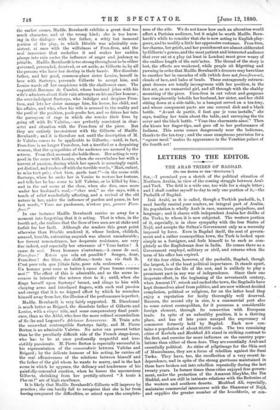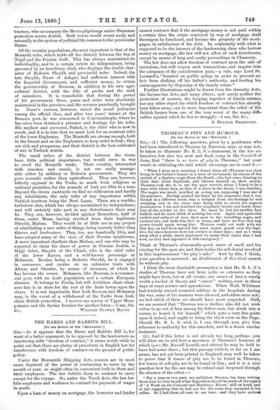LETTERS TO THE EDITOR.
THE ARAB TRIBES OF BAGDAD.
(To THE EDITOR OF THE "SPECTATOR.']
S1R,—I promised you a sketch of the political situation of Northern Arabia, in view of the coming struggle between Arab and Turk. The field is a wide one, too wide for a single letter; and I shall confine myself to-day to only one portion of it,—the Pashalik of Bagdad.
Irak Arabi, as it is called, though a Turkish pasbalik, is, I need hardly remind your readers, an integral part of Arabia. Its population is wholly Arab in race, manners, prejudices, and language ; and it shares with independent Arabia her dislike of the Turks, to whom it is now subjected. The western portion of it, especially, is in close sympathy with the free States of Nejd, and accepts the Sultan's Government only as a necessity imposed by force. Even in Bagdad itself, the seat of govern- ment and a rather cosmopolitan town, the Turk is looked upon simply as a foreigner, and feels himself to be such as com- pletely as the Englishman does in India. He comes there as a Government employe, military or civil, and returns when the term of his office has expired.
Of the four cities, however, of the pashalik, Bagdad, though the largest, is of the least political importance. It stands apart, as it were, from the life of the rest, and is unlikely to play a prominent part in any war of independence. Since their one desperate effort, in the beginning of the seventeenth century, when Amurat IV. retook and sacked the town, the Bagdadis have kept themselves aloof from politics, and are now without decided complexion, political or religions, for on the latter head they enjoy a reputation for laxity thoroughly well deserved. Bussora, the second city in size, is a commercial port also to some extent cosmopolitan, for it possesses a considerable foreign element, through its connection with European trade. In spite of an unhealthy position, it is a thriving place, and has of late years usurped the supremacy of commerce formerly held by Bagdad. Each now con- tains a population of about 80,000 souls. The two remaining cities of Kerbela and Meshhed Ali stand in striking contrast to the first, and exercise far more influence on the country popu- lations than either of these does. They are essentially Arab and essentially political. As cities of pilgrimage for the Shia sect of Mussulmans, they are a focus of rebellion against the Suni Turks. They have, too, the recollection of a very recent in- dependence, and in spite of the strong garrisons maintained in them have broken out into rebellion repeatedly during the last twenty years. In former times these cities enjoyed free govern- ment, under the protection of the Amarrat Sheyklus, the Ibn Haddal, and are still in intimate relations with the Bedouins of the western and southern deserts. Meshhed Ali, especially, maintains commercial intercourse with the Shammar of Nejd, and supplies the greater number of the hmneldaria, or con-
tractors, who accompany the Mecca pilgrimage under Shammar protection across Arabia. Both towns would revert easily and naturally to the system of political life common to the peninsular 'States.
Of the country populations, the most important is that of the Montefik tribe, which holds all the district between the Sea of Nejef and the Persian Gulf. This has always maintained its individuality, and to a certain extent its independence, being governed by an hereditary chief, who displays the double char- acter of Bedouin Sheykh and provincial ruler. Indeed, the late Sheykh, Nassr el Ashgar, had sufficient interest with the Imperial Government, and sufficient money, to obtain the governorship of Bussora, in addition to his own agri- cultural district, with the title of pasha and the rank of caimakam. It is remarkable that during the period of his government there, peace and order were absolutely maintained in the province, and the revenue punctually brought in. Nassr's success, however, raised the usual jealousies among the official class, and after two years' tenure of the Bussora post, he was summoned to Constantinople, where he has since been detained a prisoner and hostage for his tribe. Ms nephew and successor, Fahad, is the chief who is now in revolt, and it is to him that we must look for an eventual ruler of the lower Euphrates. The Montefik are strong enough, both in the Desert and on the Euphrates, to keep order in Irak ; they are rich and prosperous, and their district is the best cultivated of any in Turkish Arabia.
The small tribes of the district between the rivers have little political importance, but would serve in war to swell the Montefik ranks. Their country, intersected with marshes and canals, is not one easily manage- able either by military or Bedouin government. They are poor, nomadic rather than agricultural. They are, however,
bitterly opposed to the Turks, as much from religious as national prejudice, for the nomads of Irak are Shia to a man. -Beyond the rivers eastwards we find no cultivation and hardly nny inhabitants, the only tribe of any importance within Turkish territory being the Beni Laam. These are a warlike, turbulent clan, which has always maintained its indepehdence, and will certainly take part in any disturbances there may be. They are, however, divided against themselves, half of them, under Musa, having revolted from their legitimate Sheykh, Mizban. They would be of little use in any project .of establishing a new order of things, being scarcely better than thieves and freebooters. They, too, are fanatically Shia, and have adopted many of the vices of their Persian neighbours. A more important chieftain than Mizban, and one who may be expected to claim his share of power in Persian Arabia, is Jaber, Sheykh of the Chaab, who is the chief ruler of the lower Rerun, and a well-known personage at Mohamra. Besides being a Bedouin Sbeykh, he is engaged in commerce, and carries on an extensive trade with Ahwaz and Shuster, by means of steamers, of which he has become the owner. Mohamra, like Bussora, is a commer- cial port, with an Arab population and a certain European .element. It belongs to Persia, bat will doubtless share what- ever fate is in store for the rest of the Arab towns upon the _rivers. it is not improbable that both Bussora and Mohamra may, in the event of a withdrawal of the Turks from Irak,' claim British protection. I reserve my survey of Upper Meso- potamia, and the Syrian frontier for another letter.—I am, Sir,
WILFRED SCAWEN BLUNT.



































 Previous page
Previous page